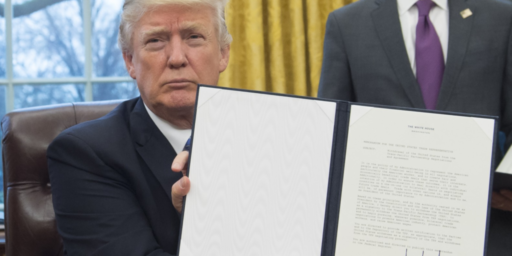Encouraging the Brain Drain
Tom Friedman non-fan Matt Yglesias seconds Friedman’s notion that foreign-born students earning Ph.D.’s in the United States should have Green Cards stapled to their diplomas (presumably figuratively speaking) and be strongly encouraged to keep their talents here.
This strikes me as reasonable enough but sparks a spirited debate in Yglesias’ comments section. Aside from issues of whether it’s fair to the country from whence these people came, most of the discussion centered on whether Americans would be getting these degrees if going to school weren’t so dadgumed expensive and if the jobs in the sciences paid more.
Since Friedman’s piece is hidden behind a subscriber wall, all I’ve read is the excerpt Matt provides plus the precis’ at the link: “I think any foreign student who gets a Ph.D. in our country — in any subject — should be offered citizenship.” So, presumably, Friedman isn’t limiting his generosity to those in shortage areas.
Having earned a Ph.D. in political science and seen how hard it is to find tenure track jobs at decent schools, I find the idea that we need to import more rather dubious. I nonetheless agree with Friedman that we should let them stay and compete. The more highly educated, bright, motivated people we have, the better.





Like everything else, it depends.
Should we be treating people with foreign degrees differently than those with degrees earned here? I think there’s a good argument for why we should but it would make a difficult sell. Particularly in healthcare “Internationally Educated Professionals” in all likelihood received their education at little or no cost to themselves. They were generally educated in state schools paid for by the taxpayers of their home countries (we’re practically the only country in the world with a private system of medical education, scandalously subsidized by our taxpayers) and their skills are desperately needed at home.
I think it’s plain wrong for us (or the Brits, French, Germans, Italians, etc. who are just as bad if not worse) to allow the citizens of Zambia (for example) to subsidize our healthcare system.
Extending that argument a little farther many of the foreign-born PhD’s are also foreign-educated at taxpayer expense. If we’re going to accept their generous donations of smart people, the least we could do is pay those taxpayers back for their investment.
Friedman is talking about people who did their grad school, at least in the U.S.A. You’re probably right that many of them had those degrees paid for by their governments, although presumably some large number are on assistantships or whatnot.
I would agree that those getting their educations paid for by their host countries owe their societies something, although it doesn’t necessarily follow that WE do. Then again, many of us get degrees in state universities and then take jobs in other states. Not quite the same thing, I guess, but there’s still some of the same moral issues.
N.b. that while JJ is up on the poli sci experience, not so many foreigners are coming here for Ph.D.’s in the humanities or soft sciences … more like engineering, physics, etc., where (I hear) they are not pushing any Americans out.
Not to sound like an arrogant American, but isn’t that Zambia’s problem to solve?
Anderson,
You are exploring the right trail here.
While most of American kids are getting degrees in Journalism, Education, or other soft sciences, a lot of foreign students are coming and exploiting the system to be schooled in the hard sciences and returning to their home countries to spur economic growth.
I remember sitting in Kennan Stadium(UNC,Chapel Hill)), a couple of years ago watching my son graduate with a degree Information Technology, along with numerous students with names that I would have trouble pronouncing. Probably less than one hundred Students.
The Journalism School, the School of Education(?) along with other soft science schools graduated thousands of students. All with familiar sounding names, presumably US citizens to go compete against thousands rather than hundreds.
No educational pursuit is more important than another, but when the domestic pool is overflowing with so many good graduates(soft sciences), the free market dictates the availability and price of your employment.
There are other factors that arise when we accept foreign students into Public institutions. Why educate them at the expense of the public’s tax-paying dollar and the have them scoot back to their native country.
>I think it’s plain wrong for us (or the Brits,
>French, Germans, Italians, etc. who are just as
>bad if not worse) to allow the citizens of
>Zambia (for example) to subsidize our
>healthcare system.
People do not belong to countries. I find the suggestion that Zambians must be ‘allowed’ to leave the country disgusting at a most basic level.
“People do not belong to countries.”
That is an emotional appeal, industrialized Nations, and their citizens are not legally obligated to support citizens who simply flee rather than have the intestinal fortitude to confront evil regimes.
There was a time, many years ago, when our forefathers confronted despots of a ruling class and decided they would rather sacrifice their fortunes, their lives, and their sacred honor to become a free people. Not just buy a plane ticket or sneak across a border, and enjoy the fruits of another man’s labor.
If you are dedicated to freedom and liberty, you fight for it, not go to a land where politicians are ensuring their career success by enfranchising more voters.
Of course, THEIR forefathers hopped a boat and left England.
Mr. Joyner,
With all due respect, their expectations were to use their energy and efforts to build a great country, not find a an environment where they protest for the US Constitutional rights, leading them to guarantees not granted in any other civilization on this planet. We care and are a good people, with values that our tradition greatly affects. In the long run, I believe we will do “what is right,” not defined in our Constitution but in our soles.
I read all your posts, thought-provoking, and at times conflicting with my believes, but the evolution of personal beliefs involves the old doctrine of ideas versus new ideas, given intellectual involvement leads us to a consensus.
Keep up the good work.
>That is an emotional appeal, industrialized
>Nations, and their citizens are not legally
>obligated to support citizens who simply flee
>rather than have the intestinal fortitude to
>confront evil regimes.
There’s a big difference between saying the US shouldn’t allow them to immigrate because we don’t need them and saying that the US shouldn’t allow them because doing so would violate Zambia’s property interest in its citizens.